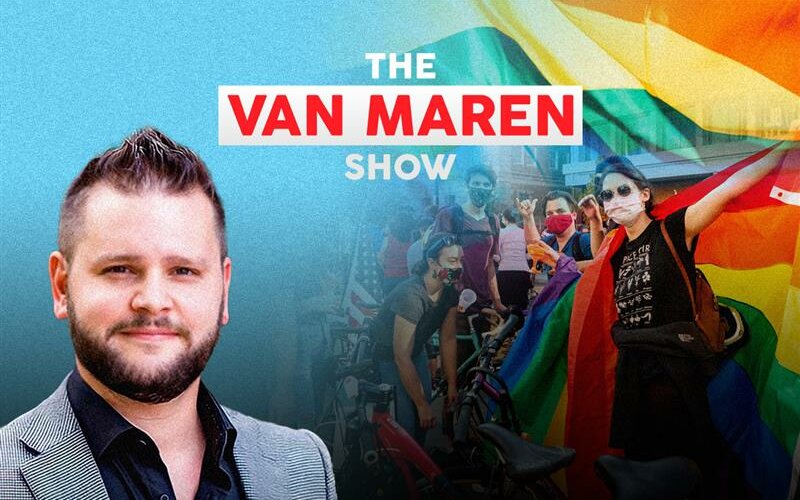(LifeSiteNews) — On this week’s episode of The Van Maren Show, Jonathon discusses how the LGBT movement has utilized the entertainment industry to effect a cultural “revolution.”
He contends that the power of storytelling is the way cultures are made or unmade, and the current storytellers “have a profoundly different value set than those Christians hold.” This power comes from the fact that viewers of television or film tend to identify with the characters on screen, making their actions and values something of no small importance. Further, people tend to be angered and “push back” against any criticism of the entertainment they consume, which he says demonstrates proof of the grip it has on people.
The entertainment industry itself, meanwhile, has over the past several decades become the “propaganda wing” of the LGBT movement, with filmmakers using their work to effect a change of values, even if subliminally, in those who consume it.
“When the storytellers of a culture have all decided to adopt the values of the Sexual Revolution over scriptural revelation, this has a real impact on the social imaginary of our culture, the collection of stories and legends and myths that help us to understand who we are and why we are the way we are,” Jonathon explains. “And several decades ago, our social imaginary would have been primarily shaped by Christianity. But since the sexual revolution, our social imaginary has been taken over by new stories, new storytellers, new soundtracks, new images.”
Christians, meanwhile, look upon the new culture and wonder why this happened. Jonathon notes the reality that our “social imaginary” has been changing for decades as culture becomes de-Christianized. And yet many Christians now actively partake of this cultural change by participating in “mainstream entertainment … sharing our own social imaginary with a deeply anti-Christian culture.”
Jonathon goes through a brief history of how the LGBT movement managed to capitalize on this, such as some storytellers’ decision to make sins like fornication or porn use seem funny, while attempting over the past decade to make it seem as though the only compassionate approach to sex and sexuality is through “affirmation” at the cost of a scriptural worldview, thus making the Christians in their stories seem villainous.
Meanwhile, the appearance of openly homosexual characters, as epitomized by Ellen DeGeneres’ decision to “come out” on television in 1997, as well as the series Will and Grace that featured an openly homosexual lead character, helped normalize homosexuality in the culture, as then Vice President Joe Biden recognized in a 2012 interview – three years before the Supreme Court redefined marriage to include same-sex “marriage.” This phenomenon was accentuated by the introduction of reality television, Jonathon maintains, and Christians became desensitized to homosexual content relatively quickly.
“That was all part of the plan,” Jonathon says. “[I]f you can desensitize somebody to something so that eventually it does not become shocking in any way, shape, or form, slowly but surely they’re boiling the frog. They’re making you feel that this is normal, even if you don’t rationally think it’s normal.”
A similar thing has occurred in regard to the transgender movement, with Bruce Jenner’s 2015 interview with Diane Sawyer acting as a catalyst for the inclusion of the gender-confused in the culture, along with Jenner’s subsequent reality television show, I Am Cait. Similarly, Time Magazine’s decision the year prior to feature on its front cover Laverne Cox, a gender-confused man and prominent actor in Netflix’s Orange Is the New Black, was a “tipping point in media for the recognition of transgender or trans-identified celebrities, shifting the culture.”
“Now nearly every major film and TV genre has transitioned, and transgender characters are a key feature of the film industry,” Jonathon observes. “And this is a potent and powerful tool for accomplishing the twin goals of normalizing every aspect of the transgender lifestyle and … demonizing anyone who disagrees with gender ideology.”
Children’s television has not been left untouched by the LGBT agenda either.
While Jonathon begins with Disney, returning to a topic that he used to open the show, he also recalls how Blues Clues, which airs on Nickelodeon, featured a ”pride” parade with a transgender beaver with mastectomy scars, how PBS show Arthur featured a same-sex “wedding,” how British show Peppa Pig featured a pair of lesbian polar bears, and more.
“The capture of our storytelling institutions by the LGBT movement has been total, and I think Christians and parents in particular have to exercise an enormous amount of caution and a great deal of discernment,” Jonathon contends.
“There is no such thing as ‘just a story,’” he continues. “Stories are very powerful. And one of the reasons, as I said at the very beginning, we know that these things are very powerful is because people react so strongly when you criticize stories that they want to watch, because if entertainment wasn’t a big deal, people wouldn’t be so angry when you suggest that perhaps they don’t watch a certain show or they don’t watch a film. But as Plato said thousands of years ago, those who tell the stories rule society.”
The Van Maren Show is hosted on numerous platforms, including Spotify, SoundCloud, YouTube, iTunes, and Google Play.
For a full listing of episodes, and to subscribe to various channels, visit our Acast webpage here.

